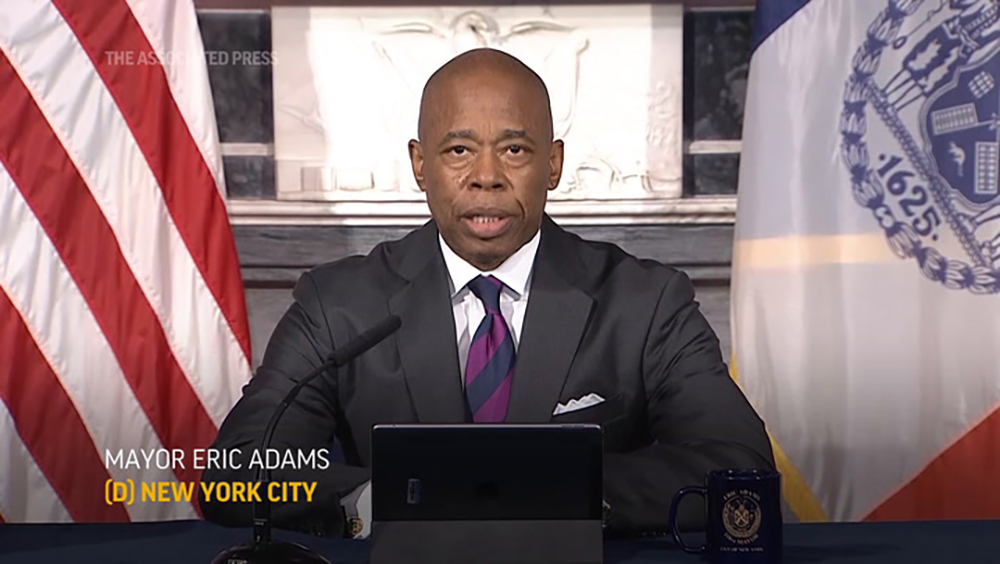|
Getting your Trinity Audio player ready...
|
Edited by: TJVNews.com
In a contentious and highly charged move, Mayor Eric Adams declared a state of emergency in New York City jails on Saturday, issuing an executive order that effectively blocked key components of a local law designed to ban solitary confinement, according to a report in the New York Times. This decisive action came just one day before the law was set to take effect and marks the latest development in the ongoing battle between the City Council and the mayor, a former police captain who campaigned on a strong public safety platform.
In December, the New York City Council made a historic move by passing legislation to ban solitary confinement in city jails in most cases, marking the city as the first major American metropolis to adopt such a policy. Indicated in the NYT report was that the legislation, passed by a decisive 39-to-7 vote, was aimed at reforming the city’s correctional system to ensure more humane treatment of detainees. However, the journey to implement this law has been fraught with challenges, culminating in a state of emergency declared by Mayor Eric Adams.
After the Council passed the legislation, Mayor Adams vetoed the bill on January 19, citing concerns about safety for both detainees and staff. The report added that despite his veto, the City Council demonstrated strong support for the reform by overriding the mayor’s veto later that month with a 42-to-9 vote.
The law aimed to eliminate solitary confinement, also known as punitive segregation, for detainees who break jail rules, allowing only a brief four-hour “de-escalation period” during emergencies. As was indicated in the NYT report, it also sought to limit the use of restraints during detainee transport, a move intended to reduce the harsh conditions often associated with solitary confinement.
The debate over the solitary confinement ban intensified in July when Steve J. Martin, a federal monitor overseeing New York City’s jail system since 2015, expressed significant concerns about the legislation. The NYT reported that in a letter to Judge Laura T. Swain, who presides over an ongoing court case involving the jails, Martin stated, “There is simply no question that situations arise in correctional settings where an immediate risk of harm must be addressed regardless of arbitrarily imposed limitations.”
Mayor Adams has consistently argued that such restrictions would jeopardize the safety of both jail staff and detainees. “The Department of Correction has been laser-focused on reducing violence in our jails to protect both the people in our care and correctional staff who boldly serve our city,” said Amaris Cockfield, a City Hall spokeswoman, as per the NYT report. She added that the federal monitor overseeing the jails had expressed concerns about the law.
The state of emergency declared by Mayor Adams is set to last for 30 days, with the possibility of extension in additional 30-day increments. This is not the first time Adams has declared a state of emergency; previous declarations were made in response to the migrant crisis and the outbreak of monkeypox, the NYT report explained. However, as noted by Cockfield, this is the first instance where the mayor has issued an emergency executive order in direct response to newly passed legislation.
The Mayor’s actions have been met with strong opposition from elected officials who supported the solitary confinement ban. Jumaane Williams, the city’s public advocate, condemned the decision as an “abuse of power.” According to the information contained in the NYT report, Williams highlighted the ongoing issues at the Rikers Island jail complex, stating, “Any state of emergency on Rikers continues to be caused by an administration that has refused to engage with partners to meaningfully improve conditions, with a preference for covering up the crisis and spreading misinformation.”
The City Council, which had pushed through the legislation despite the mayor’s veto, now faces a challenging situation. Under current laws, emergency executive orders can only be contested through the judicial system, presenting a potential legal battle ahead.
Shirley Limongi, a spokeswoman for the City Council, criticized the mayor’s executive order, stating that the new law already included “broad safety exemptions” that rendered the emergency order unnecessary. The NYT report indicated that Limongi described the action as “another example of Mayor Adams overusing executive orders without justification.”
Critics of solitary confinement argue that isolating detainees for extended periods amounts to torture. This view is supported by various states and municipalities that have already banned the practice, and there are ongoing efforts in Congress to prohibit it nationwide.
City officials, including Mayor Adams, have maintained that solitary confinement is a crucial tool for maintaining order and safety within jails. They argue that temporarily separating violent detainees is essential to prevent harm to other detainees and staff members. The NYT report said that according to the administration, solitary confinement has been effectively outlawed in city jails since 2019, and the current debate focuses on housing detainees in solitary cells for most of the day with limited time outside.
Mayor Adams’ executive order, first reported by The New York Post, asserts that the new legislation would “remove key tools necessary to mitigate the risk of violence” and “pose a direct threat to the safety of incarcerated individuals and staff” in Correction Department facilities.
The mayor’s stance has received strong backing from the correction officers’ union. Benny Boscio, the union’s president, emphasized that the provisions in the new law would endanger correction officers, the NYT report noted. He pointed to the more than 250 assaults on correction officers by inmates since the law’s passage as evidence of the risks posed by the proposed changes.





